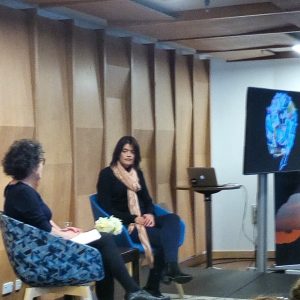Blurring the lines between fact and fiction is a way of life for Charlotte Grimshaw. Growing up in father C.K. Stead's orbit, Charlotte's world was one where every facet of life could be fictionalised.
Charlotte spoke at WORD Christchurch Festival 2018 with Kate de Goldi about her latest novel, Mazarine, in which she explores the evolution of the shattered self; through the story of a woman trying to find her adult daughter, missing in Europe, ultimately finding her own sense of being.
There is a large element of psychoanalysis in Mazarine, a sense of personal experience within the narrative. The central character of Francis is ethereal, almost non-existent in her family unit: adopted, ignored, her feelings unvalidated.
Francis keeps asking for validation of her existence throughout the book, her character lacking a sense of reality as her past has no narrative. This is a common human condition, asserts Grimshaw.
Mazarine, the 'other mother' whose son has gone missing with Francis' daughter, is the blue butterfly to Francis' brown female. (The male Mazarine gets the colour.)
Yet Charlotte was determined to avoid 'selfie fiction" - meandering existentialism with no plot - writing instead a page-turner; successful in hooking this reader with "what happens next?" Grimshaw writes a compelling mystery that crosses the world, with an essential motif - a tattoo.
When asked of her inspiration for the story, Charlotte remembers an incident that drove the beginning (a suicide at West Ham railway station - Julian Assange's lawyer) but not how circumstance took her there. Is she visited by a Muse? Charlotte suggests it might be aliens...
At the time of writing, the U.S. appeared to be on the brink of electing a female President (Hilary Clinton). Charlotte saw this as a possible zeitgeist. (Instead, the U.S. elected a 'narcissist gorilla', she says; in whose world women exist only as handmaidens, plastic effigies of themselves; beautiful, young and never fat.)
Accordingly, the characters in Mazarine are strong females; Inez, the adoptive mother who will not speak to Francis, always refusing to acknowledge her feelings is 'a towering black hole.' Mazarine, significantly the first female friend Francis has found outside her family, is the Yin to Inez' Yan. Francis' father is the handmaiden, cowtowing to Inez' dominant emotions and perception.
A wonderful session made all the more interesting by Kate de Goldi's eloquent questioning and deep analysis.
"Therapy is a truth excavator" - Kate de G.
Find out more
- Find titles by Charlotte Grimshaw
- Our WORD Christchurch 2018 page
- WORD Christchurch festival programme




Add a comment to: Charlotte Grimshaw: I and I and existentialism: WORD Christchurch Festival 2018